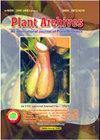TRIACONTANOL: A VERSATILE PLANT GROWTH REGULATOR IN OVERCOMING ABIOTIC STRESSES A REVIEW
Q4 Agricultural and Biological Sciences
引用次数: 0
Abstract
Plants are exposed to wide range of abiotic stresses such as salinity, drought, chilling, heavy metals, ultraviolet radiation and water logging and are detrimental to plant growth and development resulting in significant crop output losses around the world. Abiotic stress causes extensive alterations in cellular processes and affect many elements of plant physiology. Because plants are sessile, they have no choice but to respond to these. In this review, we have summarized our current understanding of Triacontanol (TRIA), a key growth-regulating signalling molecule in plants and its response to plants under different abiotic stress condition. The growth promoting role of TRIA in agricultural plants under abiotic stress has been focused on its synergistic interaction with phytohormones and induction of 9-βL(+) adenosine, which has a similar structure to that of cytokinin. The current paper examines the role of exogenously applied TRIA in morpho-physiology and biochemistry of plants in terms of growth, photosynthesis, mineral and nutrient acquisition, yield and quality under stress as well as normal condition. The mode of action and its interaction with other phytohormones in regulating physio-biochemical processes and counteracting stress induced damages are also discussed in this article.三十烷醇:一种克服非生物胁迫的多功能植物生长调节剂
植物暴露在各种非生物胁迫下,如盐度、干旱、低温、重金属、紫外线辐射和水涝,对植物生长和发育有害,导致世界各地的作物产量大幅损失。非生物胁迫引起细胞过程的广泛改变,并影响植物生理学的许多元素。因为植物是固着的,它们别无选择,只能对这些做出反应。在这篇综述中,我们总结了我们目前对三十烷醇(TRIA)的理解,三十烷醇是植物中一种关键的生长调控信号分子,它对植物在不同非生物胁迫条件下的反应。TRIA在非生物胁迫下对农业植物生长的促进作用主要集中在它与植物激素的协同作用和诱导9-βL(+)腺苷,后者具有与细胞分裂素相似的结构。本文从生长、光合作用、矿物质和营养物质的获取、胁迫和正常条件下的产量和质量等方面探讨了外源性TRIA在植物形态生理和生物化学中的作用。本文还讨论了其在调节生理生化过程和对抗应激损伤方面的作用模式及其与其他植物激素的相互作用。
本文章由计算机程序翻译,如有差异,请以英文原文为准。
求助全文
约1分钟内获得全文
求助全文
来源期刊

Plant Archives
Agricultural and Biological Sciences-Plant Science
自引率
0.00%
发文量
70
期刊介绍:
Information not localized
 求助内容:
求助内容: 应助结果提醒方式:
应助结果提醒方式:


